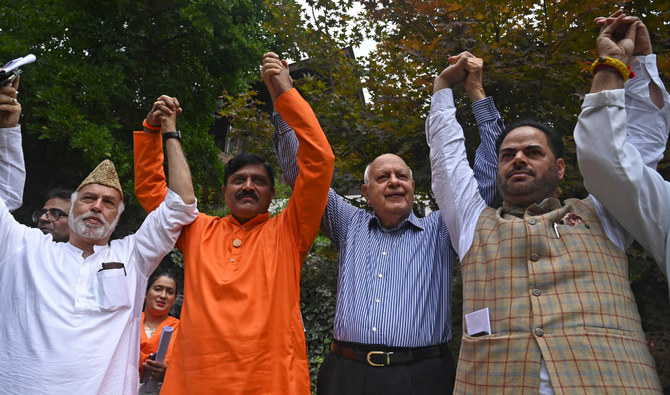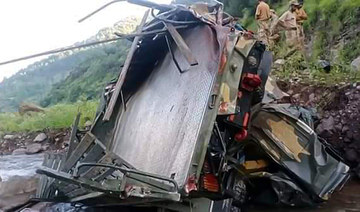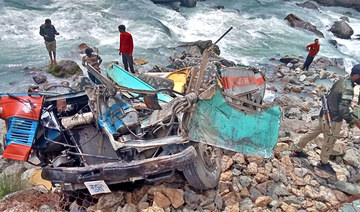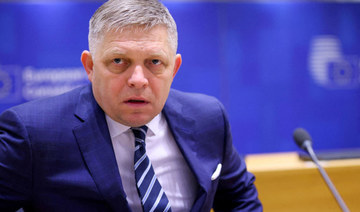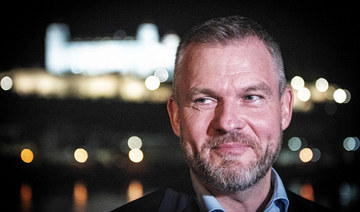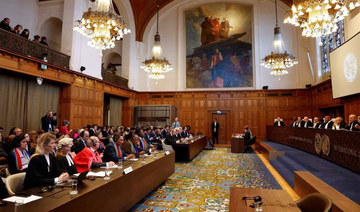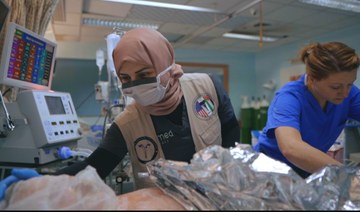NEW DELHI: An alliance of Kashmiri political parties said on Monday that the inclusion of non-locals in the region’s voter list was an attempt at “electoral demographic change,” after India’s election commission allowed troops stationed in Kashmir to cast votes in local legislative polls.
The region is claimed in full but ruled in part by nuclear arch-rivals India and Pakistan, who have fought two wars over control of the territory.
New Delhi stripped semi-autonomy from Jammu and Kashmir, its portion of the region, in August 2019, changing the Indian constitution to allow non-Kashmiris to own land there.
Last week, the election commission allowed security forces stationed in Kashmir, and outsiders working in the region, to cast votes in local legislative polls — a move that will increase Kashmir’s electorate by 2.5 million, or more than one-third, ahead of local polls expected by the year’s end.
The announcement triggered fears the decision would allow the Hindu-nationalist Bharatiya Janata Party government to alter the Muslim-majority region’s demography — a scenario feared since the abrogation of its autonomy.
Mohammed Yousuf Tarigami, a senior leader and convenor of the People’s Alliance for Gupkar Declaration — a political alliance between several regional parties in Jammu and Kashmir campaigning to restore its special autonomous status — told Arab News after Monday’s meeting of local parties that the “announcement of revision of electoral roll has created huge concerns among the larger sections of the population both in Kashmir as well as Jammu.”
“There is an apprehension in wider sections of the population that this is an attempt to inject electoral demographic change,” he said. “In the all-party meeting, it was agreed it is not acceptable to all of us.”
Farooq Abdullah, former chief minister of Jammu and Kashmir, told reporters the “fallout of voting rights to non-J&K residents will be that tomorrow’s assembly will be in the hands of outsiders.”
“Tomorrow the number may go up to 50 lakh (5 million) or 1 crore (10 million). J&K’s identity is facing a direct assault,” he said.
Kashmir’s last legislative elections were held in 2015, when the local People’s Democratic Party and Indian Prime Minister Narendra Modi’s BJP agreed to form the government.
The BJP withdrew its support for the PDP in 2018, toppling the government and putting the state under the direct rule of New Delhi. A year later, the Indian government revoked the region’s autonomy on Aug. 5, 2019, promising security and reform in the state that has for decades witnessed outbreaks of insurgency to resist control from New Delhi.
Kashmir’s special autonomous status was granted by Article 370 of the Indian constitution, which for seven decades was the basis of India’s complex relationship with the region. Article 370 allowed the region to have its own flag, freedom to make its own regulations on permanent residency, ownership of property, and fundamental rights, and to bar Indians from outside the state from settling there.
With the constitutional change, Jammu and Kashmir was split into two federally governed union territories. The announcement that outsiders will be allowed to cast votes in the next polls has raised fears not only in Kashmir but also in Hindu-dominated Jammu.
“There is a sense of fear among the people,” Subhash Gupta, a political analyst and lawyer from Jammu, said. “This is an attempt to change the electoral demography of the region. This is clear on the face of it.”
Dr. Radha Kumar, a former interlocutor for Jammu and Kashmir appointed by the Indian government, told Arab News that “the fear of the political parties in Jammu and Kashmir is justified given the way the Modi administration has acted since 2019.”
“Every fear is justified,” she added. “Military personnel must vote only in their native states as is the current rule.”



